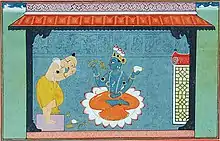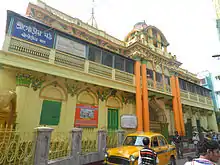Gaudiya Mission
The Gaudiya Mission (Bengali: গৌড়ীয় মিশন) is a Gaudiya Vaishnava monastic and missionary organization whose founder acharya is Srila Prabhupad (6 Feb 1874 — 3 Jan 1937) alias Srimad Bhakti Siddhanta Sarasvati Goswami Maharaja. The organisation has been registered since March 1940 in Calcutta, British India under the supervision of the then Acharya Srila Acharyadev (25 Aug 1895 — 8 March 1958[note 1]) alias Srimad Bhakti Prasad Puri Goswami Maharaj after accepting sannyasa in 1939/1941.[2][3]
গৌড়ীয় মিশন | |
 Sri Gaudiya Math, Bagbazar, Kolkata | |
| Predecessor | Gaudiya Math |
|---|---|
| Established | March 1940 |
| Founder | Nityalila Pravistha Om Vishnupad Pramhamsa 108 Srimad Bhakti Siddhant Saraswati Goswami Srila Prabhupad |
| Founded at | Calcutta, British India |
| Type | Religious organisation |
| Purpose | Educational, Philanthropic, Religious studies, Spirituality |
| Headquarters | Kolkata, West Bengal, India |
| Location | |
| Coordinates | 22°36′10.224″N 88°22′24.672″E |
Area served | 3 countries |
Official languages | Bengali, Hindi, English |
President-Acharya | Bhakti Sundar Sanyasi Maharaj |
Main organ | Governing Body & Council Body |
| Affiliations | Gaudiya Vaishnavism |
| Website | gaudiyamission |
| Part of a series on |
| Vaishnavism |
|---|
 |
History

The Gaudiya Mission is the government registered name of Sri Gaudiya Math, a famous organization that existed from 1920 to 1937. Bhaktisiddhanta Sarasvati selected Ananta Vasudev Prabhu as his successor, but sadly after Prabhupad disappeared and the positive decision of the Sri Gaudiya Math's leaders about Ananta Vasudev Prabhu as a new acharya, Kuñjabihari Vidyabusana (Kunja Babu), the secretary and the president of the Gaudiya Math did not agree with the decision and separated his own branch (the "Sri Chaitanya Math" branch in Mayapur).[2] Thus, Ananta Vasudev Prabhu later gave up his post of successor and was forced to establish a new organization (de facto renamed the Gaudiya Math) became known as the Gaudiya Mission. The 64 Gaudiya Math centers were divided into two groups in 1948 and Gaudiya Mission kept the central temple "Sri Gaudiya Math" with museum at Bagbazar in Kolkata, the headquarter of Mission up to the present day.[4][5]
Later Ananta Vasudev Prabhu started to criticize some of the teachings of Bhaktisiddhanta Sarasvati (particularly, counted the proselytizing work as not the true spirituality),[2] married, settled in Vrindavan, joined the "Babajis" and translated into Bengali 62 paper of the six Goswamis of Vrindavana, classical Gaudiya Vaishnava works. After him, the mission was headed by Bhakti Keval Audulaumi (from 1953 to 1982). Next acharyas became Bhakti Srirup Bhagavat (1982—1993) and Bhakti Suhrid Paribrajak (1993—2018).[5] The present acharya is Bhakti Sundar Sanyasi Maharaj.[6]
Current status
Main posts and organs of mission are President-Acharya, President, Governing Body and Council Body. It has 26 temples in India, UK (London, "Sri Vasudev Gaudiya Math" estd. 1933), and US (New York, "Sri Bhakti Srirup Bhagawat Gaudiya Math" estd. 2007). Approximately has a total of 60 sannyasis. Created medical services and dispensaries. It is publishing a monthly magazine"Bhakti Patra".[7]
Notes
- According to Måns Broo, 1895—1959.[1]
References
- Broo 2003, p. 275.
- Brzezinski 2004, p. 89.
- "About Gaudiya Mission". Gaudiya Mission. Archived from the original on 14 August 2018. Retrieved 5 December 2018.
- Sherbow 2004, p. 131.
- Jalakara dasa. "The Sons of the Son: The Breakup of the Gaudiya Matha". Bhaktivedanta Memorial Library. Archived from the original on 27 November 2018. Retrieved 5 December 2018.
- "Srila Bhakti Sundar Sanyasi Maharaj The New Acharya of the Gaudiya Mission". VINA news. 7 November 2018. Retrieved 13 December 2018.
- "Centers". Gaudiya Mission. Retrieved 5 December 2018.
Bibliography
- Broo, Måns (2003). As good as God: the guru in Gauḍīya Vaiṣṇavism (PDF). Åbo: Åbo Akademi University Press. ISBN 951-765-132-5. Archived from the original (PDF) on 6 March 2016.
- Brzezinski, Jan (2004). "Charismatic Renewal and Institutionalization in the History of Gaudiya Vashnavism and the Gaudiya Math". In Bryant, Edwin F.; Ekstrand, Maria L. (eds.). The Hare Krishna Movement: The Postcharismatic Fate of a Religious Transplant. New York: Columbia University Press. pp. 73–96. ISBN 0-231-12256-X.
- Sherbow, Paul H. (2004). "A.C. Bhaktivedanta Swami's Preaching in the Context of Gaudiya Vashnavism". In Bryant, Edwin F.; Ekstrand, Maria L. (eds.). The Hare Krishna Movement: The Postcharismatic Fate of a Religious Transplant. New York: Columbia University Press. pp. 129–46. ISBN 0-231-12256-X.
